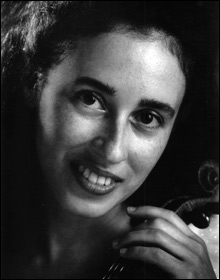
Zina Schiff |
It was brave of the Longwood Symphony Orchestra to open its 2010–2011 season opposite Opening Night at Symphony last Saturday — and braver still to do so with a no-symphonies program of Sibelius and Delius. Actually, one could have gone to both openings: the BSO patrons were out by 7:30 pm, and the Longwood concert didn't start till 8. Few if any availed themselves of the opportunity: Jordan Hall was hardly half full. But those who opted for post-performance dining over more music missed a performance of the Sibelius Violin Concerto that compared favorably with the one the BSO offered in 2005.
Which is saying something, since the BSO's guest conductor back then was Paavo Berglund, who at a frail 76 was still arguably the world's greatest living interpreter of Sibelius. The Longwood had its own music director, the in-demand Jonathan McPhee (he also directs the Lexington Symphony, the Nashua Symphony, and the Boston Ballet Orchestra), and as the soloist in the Sibelius it had Jascha Heifetz protégée and new Boston resident Zina Schiff. Julia Fischer, Berglund's soloist, approached the concerto as a European virtuoso vehicle, à la the Beethoven, the Brahms, or the Tchaikovsky, but she sounded like a tourist in the primæval forest of Berglund's Tapio. Schiff melted into McPhee's opening shimmer, a vulnerable, Lemminkäinen-like hero listening to the woodland and responding. Her tone could be angular, even sinewy, but her phrasing was weighted, and she gave it an almost Gypsy swing. (Finnish and Hungarian are hardly siblings, but the two languages are more closely related to each other than either is to, say, French or German.) McPhee is a more direct Sibelian than Berglund — among contemporary peers, Osmo Vänskä springs to mind. He got some glorious low-register fanfares out of the orchestra, but what was most gratifying about the performance was the room he and Schiff made for each other.
After intermission, McPhee picked up the microphone to explain that though Frederick Delius is hardly a household name in America, in his native England he's the air people breathe. My own appreciation of this composer was permanently stunted by his appearance in Dylan Thomas's satire "How To Be a Poet, or The Ascent of Parnassus Made Easy," where one of our hero's poems is titled "On Hearing Delius by a Lych-Gate." McPhee alerted us to listen to the shifting colors in "The Walk to Paradise Garden," a later (1906) addition to Delius's 1900-'01 opera A Village Romeo and Juliet, but all I could hear was a muzzy romanticism. No point blaming conductor or orchestra, especially in light of what followed, the Suite from Sibelius's early (1893) Karelia pageant music, the Intermezzo noble if just a shade lacking in backbeat, the Ballade haunted, the March exuberant.
The Longwood is unusual in that its members are mostly area medical professionals, and each concert benefits a charity (the Art Connection, in this case), but it's long passed the point of being a curiosity. McPhee is one of Boston's two or three best conductors, and he programs works that you hardly hear elsewhere and then wonder why not. The Longwood's next concert, December 4, will offer Borodin's tuneful Symphony No. 2 (parts of it wound up in the musical Kismet) and then, ambitiously, music from Wagner's Götterdämmerung: "Dawn & Siegfried's Rhine Journey" and, with soprano Joanna Porackova, "Brünnhilde's Immolation." How's that for a shot across Jimmy's bow?